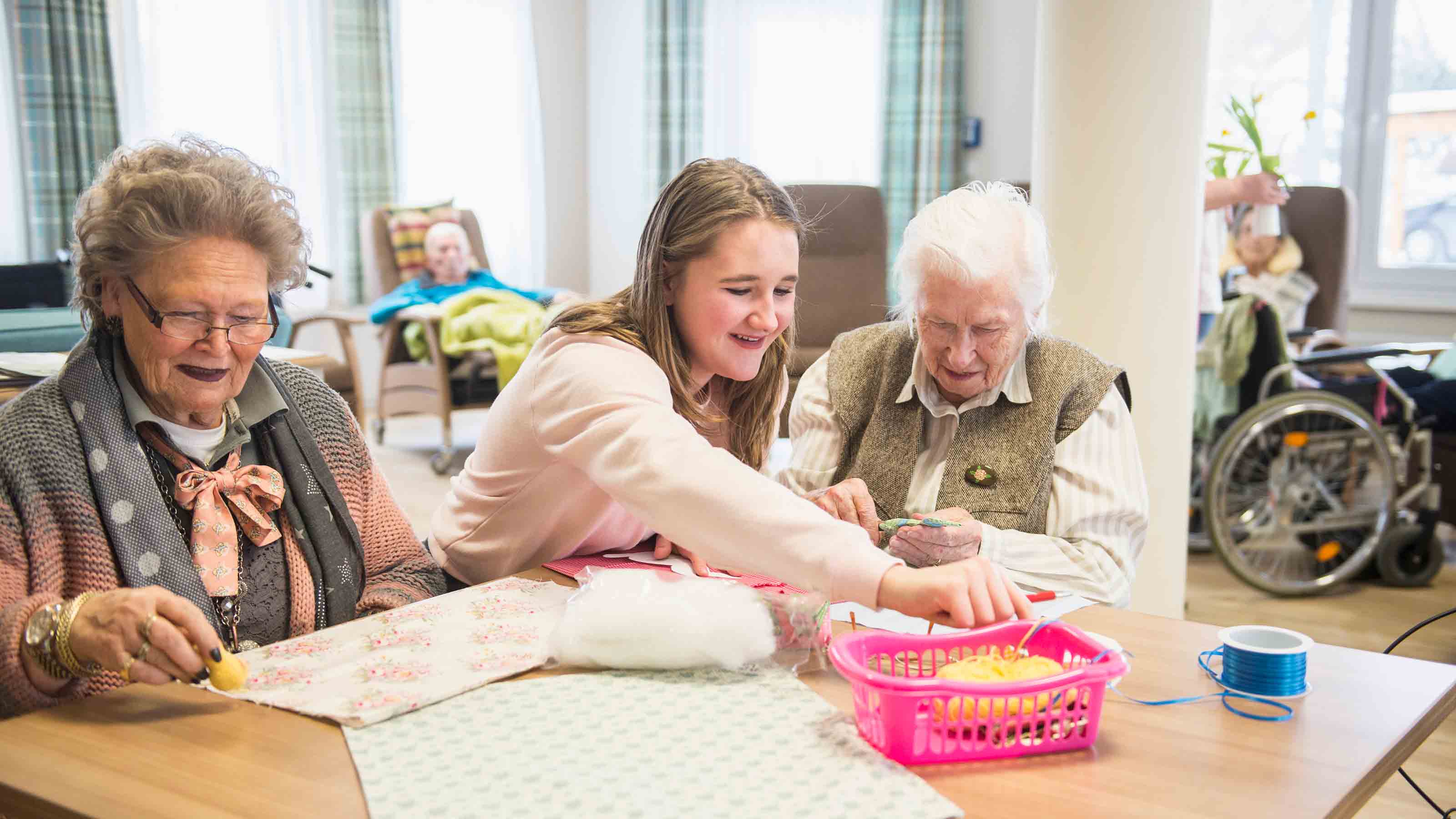Where Will Your Parents Live?
They have several options, including ways to stay in their own home.
Profit and prosper with the best of Kiplinger's advice on investing, taxes, retirement, personal finance and much more. Delivered daily. Enter your email in the box and click Sign Me Up.
You are now subscribed
Your newsletter sign-up was successful
Want to add more newsletters?

Delivered daily
Kiplinger Today
Profit and prosper with the best of Kiplinger's advice on investing, taxes, retirement, personal finance and much more delivered daily. Smart money moves start here.

Sent five days a week
Kiplinger A Step Ahead
Get practical help to make better financial decisions in your everyday life, from spending to savings on top deals.

Delivered daily
Kiplinger Closing Bell
Get today's biggest financial and investing headlines delivered to your inbox every day the U.S. stock market is open.

Sent twice a week
Kiplinger Adviser Intel
Financial pros across the country share best practices and fresh tactics to preserve and grow your wealth.

Delivered weekly
Kiplinger Tax Tips
Trim your federal and state tax bills with practical tax-planning and tax-cutting strategies.

Sent twice a week
Kiplinger Retirement Tips
Your twice-a-week guide to planning and enjoying a financially secure and richly rewarding retirement

Sent bimonthly.
Kiplinger Adviser Angle
Insights for advisers, wealth managers and other financial professionals.

Sent twice a week
Kiplinger Investing Weekly
Your twice-a-week roundup of promising stocks, funds, companies and industries you should consider, ones you should avoid, and why.

Sent weekly for six weeks
Kiplinger Invest for Retirement
Your step-by-step six-part series on how to invest for retirement, from devising a successful strategy to exactly which investments to choose.
Most older Americans don't want to move. Fortunately, the growth of home services for the elderly has made aging in place possible for those who can afford it. For those who can't, or think they can't, some creative financial thinking could help to make the difference.
If your parents' mortgage is paid off but they are still straining to make ends meet, they might consider a reverse mortgage or a sale-leaseback to ease their financial burden.
A reverse mortgage can allow a homeowner to borrow against a portion of the equity in the home without having to pay back any principal or interest until the home is sold, possibly after the owner's death. Borrowers can take the money as a monthly income stream, a lump sum, or even a line of credit to be tapped as needed.
From just $107.88 $24.99 for Kiplinger Personal Finance
Become a smarter, better informed investor. Subscribe from just $107.88 $24.99, plus get up to 4 Special Issues

Sign up for Kiplinger’s Free Newsletters
Profit and prosper with the best of expert advice on investing, taxes, retirement, personal finance and more - straight to your e-mail.
Profit and prosper with the best of expert advice - straight to your e-mail.
Sale-leasebacks typically involve parent and child, but an outsider can also be part of the deal. You buy the home directly from your parents (they act as the lender, taking back a mortgage), then you lease it back to them. Your down payment gives them an immediate infusion of cash and your mortgage payments provide a monthly income. In turn, your parents write you a check each month for the rent. Any difference between the mortgage payment they get and the rent they pay can be additional income for them.
Should your parents live with you? Don't be surprised if your aging, widowed mother doesn't want to move in with you. According to surveys, most seniors would rather move into a facility that offers some assistance than move in with a relative or friend. Message: They don't want to be a burden.
To allay that feeling, perhaps your parents would want to pay rent. However, if you know this living arrangement won't work out, consider these alternatives:
Independent-living communities offer healthy seniors a sense of security in addition to some basic services, such as housekeeping, meals, alarm systems, and a nurse or health clinic on-site. Housing options range from apartments to townhouses to single-family homes.
Assisted-living facilities provide round-the-clock assistance for residents who can't manage completely on their own. However, they are not nursing homes. Residents live in apartments or rooms, either alone or with another resident. Some long-term-care policies cover a portion of the costs. Contact the local Area Agency on Aging (it's in the phone book as part of the local-government listings) and Ask for a list of assisted-living homes in the area.
Continuing-care retirement communities, or CCRCs, offer a range of living options, from independent living to assisted living and a skilled-nursing home in the same development. Along with the range of housing, there is a range of fees at such facilities, including entry fees and monthly service fees. At some facilities you can buy your residence or a "membership" in the CCRC, then contract separately for the service and health care portion. Check the Commission on Accreditation of Rehabilitation Facilities' Web site for CCRCs in your state.
A skilled-nursing facility provides a high degree of care with a registered nurse on staff 24 hours a day and doctors and clergy on call. If someone needs special medicines or therapy but not round-the-clock care, then an intermediate-care facility may be sufficient. Although registered nurses are on staff, they may not be available 24 hours a day. Some nursing homes offer a combination of care levels, with separate wings for skilled-nursing and intermediate care. For names of nursing homes in your area, contact your state's Area Agency on Aging, as well as the Eldercare Locator.
Profit and prosper with the best of Kiplinger's advice on investing, taxes, retirement, personal finance and much more. Delivered daily. Enter your email in the box and click Sign Me Up.
-
 Over 65? Here's What the New $6K 'Senior Deduction' Means for Medicare IRMAA Costs
Over 65? Here's What the New $6K 'Senior Deduction' Means for Medicare IRMAA CostsTax Breaks A new deduction for people over age 65 has some thinking about Medicare premiums and MAGI strategy.
-
 U.S. Congress to End Emergency Tax Bill Over $6,000 Senior Deduction and Tip, Overtime Tax Breaks in D.C.
U.S. Congress to End Emergency Tax Bill Over $6,000 Senior Deduction and Tip, Overtime Tax Breaks in D.C.Tax Law Here's how taxpayers can amend their already-filed income tax returns amid a potentially looming legal battle on Capitol Hill.
-
 5 Investing Rules You Can Steal From Millennials
5 Investing Rules You Can Steal From MillennialsMillennials are reshaping the investing landscape. See how the tech-savvy generation is approaching capital markets – and the strategies you can take from them.
-
 What DOGE is Doing Now
What DOGE is Doing NowThe Kiplinger Letter As Musk's DOGE pursues its ambitious agenda, uncertainty and legal challenges are mounting — causing frustration for Trump.
-
 COVID Hospitalization Rates See an Uptick As Winter Looms — The Kiplinger Letter
COVID Hospitalization Rates See an Uptick As Winter Looms — The Kiplinger LetterThe Kiplinger Letter A new Omicron booster is available, but the elderly are still at risk and winter is right around the corner.
-
 Will Weight-Loss Drugs Spike Medicare Costs?: The Kiplinger Letter
Will Weight-Loss Drugs Spike Medicare Costs?: The Kiplinger LetterEconomic Forecasts Lawmakers are trying to get weight-loss drugs like Wegovy covered by Medicare. Long-term savings are possible, but it could cost the program $27 billion.
-
 Greenland, U.S. Plans to Boost Tourist Economy: Kiplinger Economic Forecasts
Greenland, U.S. Plans to Boost Tourist Economy: Kiplinger Economic ForecastsEconomic Forecasts A U.S. congressional effort could see some Canadian visitors get longer stays, meanwhile, Greenland bids to be the next vacation hotspot.
-
 Medicare Drug Price Negotiations Latest: Kiplinger Economic Forecasts
Medicare Drug Price Negotiations Latest: Kiplinger Economic ForecastsEconomic Forecasts Medicare drug price negotiations: Early signs have emerged of how these key talks will be handled.
-
 Estate Planning: A Special Trust for a Special Need
Estate Planning: A Special Trust for a Special NeedCaregiving Special needs trusts can help fund quality-of-life improvements for the beneficiary, such as a phone, a trip or a private room in a group care facility.
-
 Adult Day Centers Help Retirees with Alzheimer's
Adult Day Centers Help Retirees with Alzheimer'sCaregiving A center that offers social interaction, along with physical and memory activity, is a lift for those with forms of memory impairment. Their caregivers benefit, too.
-
 Caregivers Share Their Stories
Caregivers Share Their StoriesCaregiving Readers' own perspectives on the struggles and triumphs of caregiving.